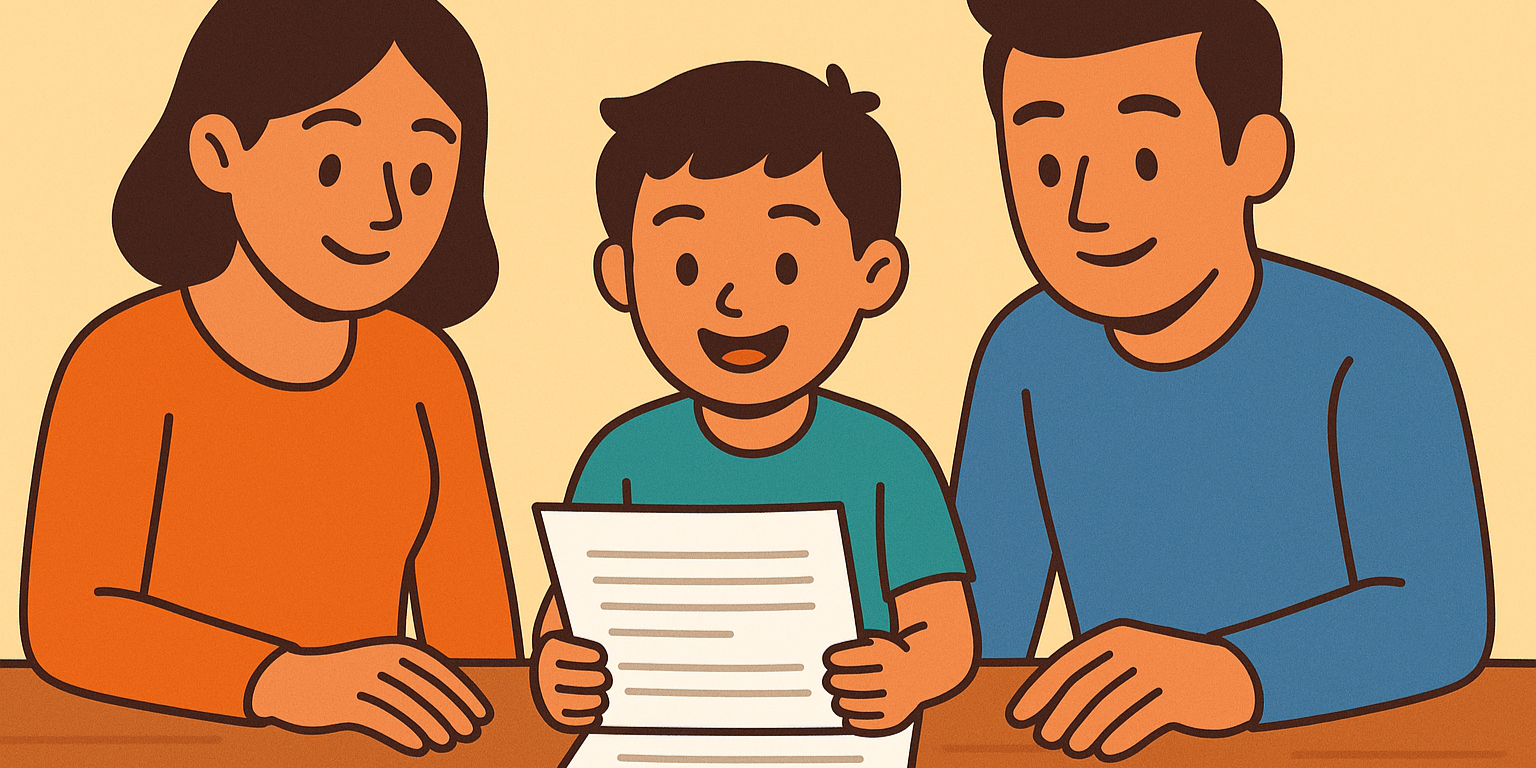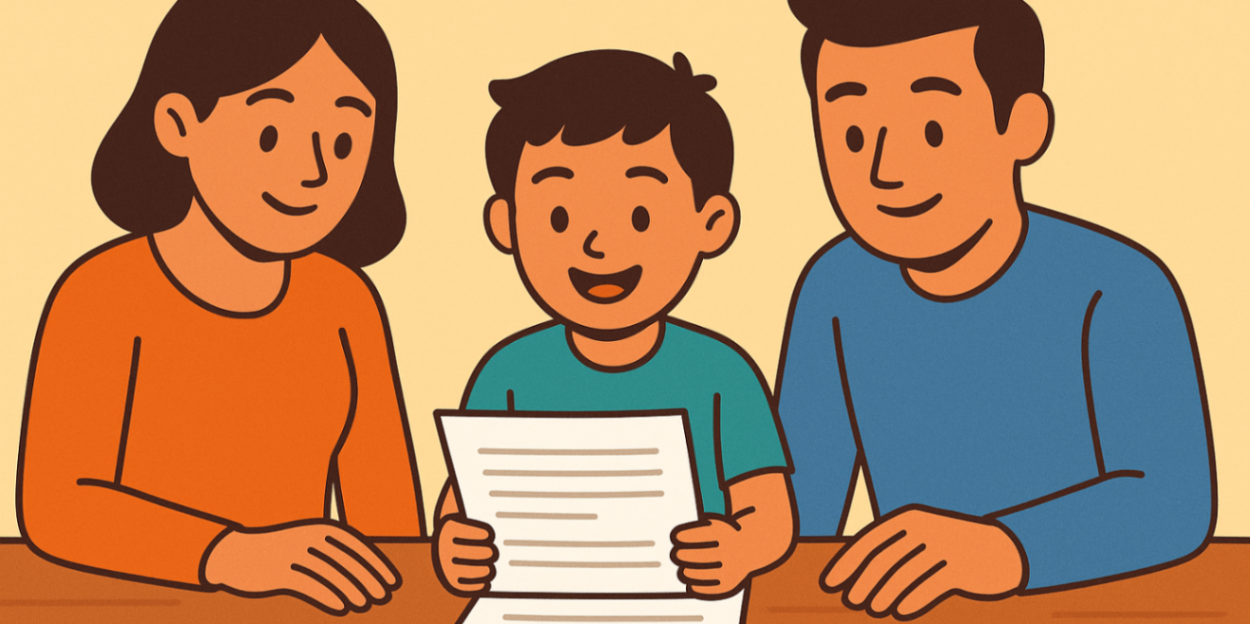
behaviour support plans under ndis: parent guide
8 July, 2025
Mastering Your Child’s NDIS Behaviour Support Plan: Real Examples & Proven Strategies
Navigating the National Disability Insurance Scheme (NDIS) can feel overwhelming—especially for parents supporting a child with developmental or behavioural needs. One of the most practical and impactful tools funded under NDIS is a behaviour support plan: a personalised document that outlines positive, evidence-based strategies to reduce challenging behaviours and teach new, more appropriate skills.
Behaviour support plans are a core part of NDIS behaviour therapy. They are developed by trained professionals using insights from a functional behaviour assessment (FBA), and are tailored to your child’s specific needs—at home, in school, and within the community. These plans focus on prevention, skill-building, and collaboration between parents, therapists, and educators.
In this parent-friendly guide, we’ll break down:
-
What a behaviour support plan includes,
-
Real examples of strategies in action,
-
How these plans are created under the NDIS,
-
And how they support children with autism, ADHD, speech delays, and other complex needs.
Key Takeaways
-
A behaviour support plan (BSP) under NDIS is tailored to each child’s unique needs, support environment, and goals.
-
BSPs include strategies like positive reinforcement, skill-building, and prevention techniques based on functional behaviour assessments.
-
These plans aim to reduce challenging behaviours and support long-term development and independence.
-
Practitioners, educators, and parents work together with your NDIS behaviour support practitioner to monitor and adapt the plan.
-
Liverpool families can access BSPs through NDIS behavioural support providers, including mobile services across the region.
Understanding NDIS Behaviour Support Plans in Liverpool
Behaviour support plans are essential tools funded under the NDIS for children with developmental disabilities or challenging behaviours. In Liverpool, families can access specialised behavioural support services from NDIS-registered providers who tailor plans to each child’s needs.
A behaviour support plan identifies behaviours of concern, explores the reasons behind them, and recommends practical, individualised support strategies. These strategies are built from a functional behaviour assessment and may include positive reinforcement, prevention-based environmental adjustments, and skill-building interventions.
With local access to NDIS behavioural support in Liverpool, families benefit from expert guidance, consistent reviews, and practical tools to help their child succeed at home, school, and in the community.
If you want a clear, parent-friendly explanation of Positive Behaviour Support, read Understanding Specialised Positive Behaviour Support for Kids.
What Is a Behaviour Support Plan?
A behaviour support plan (BSP) is a written, individualised support document developed for children who exhibit behaviours of concern. It is designed by a trained behaviour support practitioner using data collected during a functional behaviour assessment that identifies positive skills, triggers, and functions of the behaviour, helping the team tailor effective interventions.
The plan includes:
-
A clear description of behaviours of concern
-
Prevention strategies to reduce triggers
-
Positive behaviour support strategies to build new skills
-
Environmental adjustments and structured routines
-
A plan for consistent implementation and progress monitoring
Each BSP is regularly reviewed and adapted to ensure the strategies remain relevant and effective as the child grows and their needs evolve.
To see how these plans apply in real-life NDIS scenarios, read our guide on understanding the NDIS behaviour management plan for effective support.
Why Are Behaviour Support Plans Important for Children with Complex Needs?
Behaviour support plans, specifically a positive behaviour support plan, are important for children who have complex needs. They give clear ways to help a child learn and manage how they feel. With these plans, there are steps to support good behaviour and help kids learn new skills that they will use in life. They also help kids get along better with others, whether at home, in school, or somewhere else. In the end, having a positive behaviour support plan can make a big difference in the child’s life and help them do well in many areas.
Key Components of a Behaviour Support Plan
 A behaviour support plan (BSP), also called a behaviour intervention plan, helps bring about good changes for a child. It starts by clearly saying what the problem behaviours are. This is done by looking at what is found in the functional behaviour assessment. The plan uses strategies like teaching new actions to replace the problem behaviours. It adds positive reinforcement to help keep the child on track. This makes sure the unwanted actions go down.
A behaviour support plan (BSP), also called a behaviour intervention plan, helps bring about good changes for a child. It starts by clearly saying what the problem behaviours are. This is done by looking at what is found in the functional behaviour assessment. The plan uses strategies like teaching new actions to replace the problem behaviours. It adds positive reinforcement to help keep the child on track. This makes sure the unwanted actions go down.
Team members are very important in this process. Educators, therapists, and parents all work together. They set clear goals that can be measured. They also check on progress all the time. Data collection is important, since it shows whether the interventions used in the BSP are helping. This lets everyone know if the child is really moving forward.
We use these positive behaviour support strategies in both clinic-based and in-home NDIS behavioural therapy across Liverpool.
Functional Behaviour Assessment Explained
A Functional Behaviour Assessment (FBA) is the first step when making a good plan for helping with behaviour. The FBA looks at what happens before and after problem behaviours. This helps people see why the behaviour happens. For example, a child may act up to get out of doing something or to get attention. The FBA makes these reasons clear.
Data collection is a key part of the FBA process. People track the different types of behaviours, how often they happen, and what is going on at that time. By looking at this data, people can figure out what sets off the behaviour and what keeps it going. They use this to come up with ideas about what is causing the behaviour. Then, they make plans to target those reasons.
Also, when the FBA shares clear information, the plan will focus on real and measurable steps. These steps go straight to the main problems. No matter if the plan is for kids with developmental disabilities or for other tough behaviours, the FBA helps make answers that fit the child’s unique needs. This helps give real improvement that can last.
Positive Behaviour Support Strategies
Positive behaviour support strategies help turn tough actions into good behaviour. Prevention strategies work by changing the environment or daily routines. This means there will be less stress that can cause unwanted actions. For example, if you give a predictable schedule to a child with ASD, then you can lower the child’s anxiety and make the day go better.
Positive reinforcement is at the center of these ideas. This type of reinforcement works when you reward good behaviours right away and every time they happen. The reward could be a quick “good job,” giving a token, or letting them do something they like. This helps a child get new skills and keep using the right behaviour. Replacement behaviours help the child find other ways to meet their needs without acting out.
Strategies include:
-
Providing visual schedules to increase predictability.
-
Offering choices during tasks to build engagement.
-
Teaching communication skills to replace aggressive outbursts.
-
Ensuring sensory accommodations, such as safe spaces or headphones, to reduce distress.
These strategies give children the tools they need to face their own unique behaviour challenges. At the same time, they help kids learn, grow, and use new skills in everyday life.
Role of Behaviour Support Practitioners
Behaviour support practitioners have a key job in putting behaviour plans into action. These experts work with team members to adjust plans, so that every step matches the child’s age and needs. Their skills help make sure that interventions will fit into the child’s normal life and be easy to reach.
They also take care of data collection and show results to the team. By following this process, they help the team use what works and see what needs to change in the plan. Checking the data all the time lets us see where things are good or what to do differently. This helps you see clear progress as time goes on.
Practitioners are an important part of the team. They also give training to family members and educators. Their support for family members and team members makes sure everyone follows the behaviour plan the same way. This helps the plan work better and leads to better behaviour for the child.
Learn more about what makes a good behaviour support practitioner and how they work with families under the NDIS.
Examples of Behaviour Support Strategies in Action
 Parents often ask how behaviour support can help their child in the real world. For example, positive behaviour strategies teach kids to ask for a break instead of yelling or acting out. These taught replacement behaviours become second nature to them. Kids start to use these skills both at home and at school.
Parents often ask how behaviour support can help their child in the real world. For example, positive behaviour strategies teach kids to ask for a break instead of yelling or acting out. These taught replacement behaviours become second nature to them. Kids start to use these skills both at home and at school.
NDIS behaviour therapy helps create positive outcomes by using these strategies all the time, including NDIS behaviour therapy, which supports children who have developmental disabilities and helps cut down on confusion or stress. Kids feel more sure of themselves as they face daily challenges. This way works in real life and gives parents and caregivers new hope for their kids.
Case Study: Managing Aggressive Outbursts in a Child with Autism
A seven-year-old child with Autism Spectrum Disorder (ASD) would often have aggressive outbursts every day. These always happened when he had to stop doing something he liked and start a less fun activity. This change would upset his routine.
With a detailed BSP in place, the team started to use visual schedules. They also showed the child how to say a simple phrase if he needed more time to get ready for the next activity. After some time, both the length and strength of his aggressive behaviour went down a lot. This showed that these specific tips really worked.
They used data collection to watch progress. The team looked at how often the child acted out in an aggressive way. Their records showed a steady drop in these behaviours. This example shows how working on antecedent changes and teaching replacement skills can help children with ASD have better days.
Case Study: Enhancing Communication Skills in a Nonverbal Child
Tailored steps can really help children who are not able to speak. A functional behaviour assessment (FBA) shows what events or actions make them feel upset. After this, a behaviour support plan (BSP) was made. This plan uses positive reinforcement to help children learn, which means giving rewards when kids show good behaviour. Family members and therapists work together to use new ways for these kids to show what they want. They use pictures and sign language to help children get their ideas out. This team found that children tried to communicate more often. The results show that using prevention strategies and positive behaviour support can help children learn new skills and bring positive outcomes. This work also shows how important reinforcement is, and how family members can help develop positive behaviour day by day.
Case Study: Addressing Attention-Deficit Behaviours in a School Setting
In a school, the team members made a behaviour support plan (BSP) for a child who showed attention-deficit behaviours. They used a functional behaviour assessment (FBA) to look for what happened right before the child acted out, ruling out any underlying health issues. The findings helped them spot the main triggers, including the duration of certain behaviours. The team members then created positive reinforcement plans for different classroom situations. This made it easier to support and reinforce replacement behaviours.
By using prevention strategies and tracking the number of times the attention-deficit behaviours showed up, the team helped the child build new skills. This raised classroom engagement and led to positive outcomes for everyone.
These examples show how NDIS behaviour support plans are tailored for real children and their environments.
Accessing NDIS Behavioural Therapy Services in Liverpool
Finding NDIS behavioural therapy services in Liverpool can be done in a few simple steps. First, go to the NDIS website and look for a list of registered providers. This helps make sure that the people you find are ready to offer behaviour support made for children with developmental disabilities. You can also talk to local community groups and support networks to get their recommendations. It is good to ask team members who have gone through this before about what worked for them. They can share how they got positive outcomes and tell you about the best ways to get the right behaviour intervention plan.
If you're unsure where to start, this local guide on navigating the NDIS for behavioural therapy in Liverpool outlines every step.
How to Find NDIS-Registered Behaviour Support Practitioners
Finding NDIS-registered behaviour support practitioners is a simple process if you take it step by step. Start by asking family members or local support groups for suggestions. Make sure to look at the person’s background in ABA and how much experience they have with developmental disabilities. It’s important to see if their way of doing positive behaviour support will work well for your child.
Also, check if they know how to use FBA and different prevention strategies. This can help you get good, positive outcomes for your child. Speak to more than one practitioner so you can compare what they offer and when they are available.
Funding Options for Behavioural Therapy under NDIS
Knowing the funding options from the NDIS matters if you want your child with complex needs to get the right behaviour therapy. The support budgets from the NDIS can be used to pay for key services. This includes a behaviour support plan (BSP) and general behaviour therapy. These help your child show more positive behaviour and deal with challenging behaviour.
Using good data collection and information from a functional behaviour assessment (FBA) can help find which therapy will get funded. To get the best use of this funding, it helps to work with team members. They can help families find realistic measurements to make sure they are reaching positive outcomes and can keep seeing progress over time.
Collaborating with Your Behaviour Support Team

A strong partnership with your behaviour support team helps make positive outcomes more likely. When team members like behaviour support practitioners, therapists, and family members work together, they all share what they know from data collection and the results of the functional behaviour assessment (FBA). This teamwork makes it possible to create useful behaviour intervention plans (BIPs) and use positive reinforcement. Open communication lets the family’s goals match with the support plan. This helps the person learn new skills and deal with challenging behaviour better.
Getting Started with Behaviour Support Plans
Developing a BSP starts with an FBA. This looks at the things that happen before and after a person shows challenging behaviour. When you work with family members and team members, you can get the data you need. This data helps you plan good prevention strategies. After that, decide on realistic measurements. These measurements let you track positive outcomes and see if your interventions work. This process helps you focus on new skills. It also uses reinforcement to build positive behaviour. With this plan, it can be more easy to help people with developmental disabilities.
Summary
To sum up, behaviour support plans help a lot in making life better for children with complex needs. These plans use data from functional behaviour assessments and focus on positive behaviour and positive behaviour support. This helps families teach children new skills and stop problem behaviours before they start. When families work with NDIS-registered practitioners, they can make plans that fit the needs of each child, which leads to positive outcomes. Early intervention and data collection also make these plans work better. This way, children with developmental disabilities get the support they need at the right time.
Ready to Start Your Child’s Behaviour Support Plan?
Our Liverpool-based team specialises in NDIS behavioural support and personalised behaviour plans for children with developmental needs. Whether you’re just starting your NDIS journey or want to improve an existing plan, we’re here to help with expert guidance and local, in-home or clinic-based support.
Book your consultation now to connect with a qualified behaviour support practitioner in Liverpool.
Frequently Asked Questions
What is the role of restrictive practices in NDIS behaviour support plans?
Restrictive practices are considered only when absolutely necessary and must follow strict NDIS guidelines. They aim to prevent harm, and every use must be clearly documented, monitored, and reviewed. The goal of a positive behaviour support plan is to reduce the need for any restrictive practice over time.
What should parents expect during the NDIS behaviour support planning process?
Parents can expect an initial assessment, collaboration with a trained behaviour support practitioner, and a detailed written plan. The plan will include goals, positive behaviour strategies, and review processes. It’s tailored to the child’s needs and includes ongoing monitoring to ensure progress. NDIS behaviour therapy funding often covers these services when delivered by registered providers.
Who is involved in implementing and monitoring the plan?
Putting a behaviour support plan in place and making sure it works usually need parents, teachers, and registered behaviour support workers to work together. When these people help one another, the plan will fit the needs of the child better. This helps keep the same ways of doing things in all the places the child goes, so the child can make the best progress.
Can a behaviour support plan be changed as my child’s needs change?
Yes, behaviour support plans can change as your child's needs change. You, and the support team, should have regular reviews. This helps to keep the plan up to date. It will make sure new challenges or changes in your child's behaviour are addressed. This also helps them keep making progress.
.svg)


















